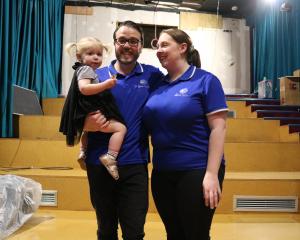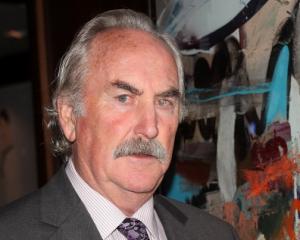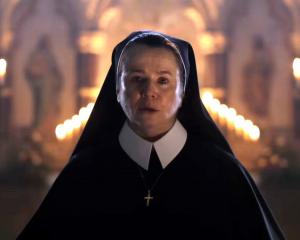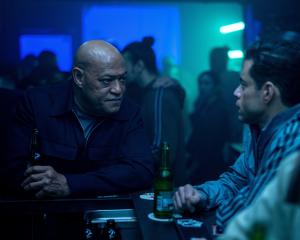
In director Welby Ings’ telling, it took him three years to find the actor to play Whetu in his new film Punch.
But when it happened, there was no doubt he’d found his man.
The actor who walked into the audition room, ending Ings’ search, was Conan Hayes — a former Kings High School pupil and star of high school Shakespeare competitions during his Dunedin years.
"I had to find someone who wouldn’t just interpret the part, he had to be able to possess it," Ings told Kim Hill during a Saturday Morning interview.
"He didn’t nail it, he drank the character into himself."
Hayes (24) was particularly keen to impress, and not just because he needed work after Covid had meant a rushed return to Dunedin from Melbourne for the nation’s first long lockdown. Back in Auckland as things began to open up, earning a little putea was a priority. At about which point his agent let him know about the role and the opportunity to audition.
"What appealed to me about the email and the audition was that it had always been a goal of mine to play a queer role in a queer film, and when I read that there was also a takatapui narrative — and being takatapui Maori myself — I knew I wanted to get as far as I could in the audition process," he says modestly.
Punch tells the story of two young men each striving in their own way to overcome the limitations of small-town New Zealand.
Whetu is living a life on the fringes, still at high school but mainly treading water until he can escape the claustrophobic and sometimes hostile environment.
Playing opposite Hayes is Jordan Oosterhof, as Jim, a promising young boxer determined to literally scrap his way to something better.
Their paths cross and for the first time Whetu and Jim glimpse the possibility of finding something precious where they are.
The film premiered at the New Zealand International Film Festival, so the secret of Hayes’ star quality is out (if his webseries Self Help hadn’t already let that cat out of the bag), and will spread as Punch returns on general release.
"A lot of people from the queer community have expressed that they enjoyed the film and feel that they can relate to Whetu, which is lovely," Hayes says of early feedback.
Punch doesn’t shy away from the cruel homophobia faced by the queer community, but Hayes was drawn to Whetu’s ability to rise above it.
"What attracted me to Whetu was how he still sees the beauty of his world despite all the projections put on to him from the small town — he’s a real artist and a real individual, so I wanted to make sure he was resilient, fiery and grounded," he says, listing qualities that informed his work.
"At the beginning of a character process I like to go ‘what is their main spine or anchor, what holds them throughout the film’? And for me the main anchor for Whetu I held on to throughout that process was his sovereignty, mana motuhake.
"Whetu’s faith in his tupuna and the atua was a choice I ran with for him to be able to hold his beauty when he’s alone and hold his strength when he is needing to be around other people. In doing that I grew closer to my own connection with my tupuna and atua, in terms of a way of seeing, because that was something I had to hold on to throughout the shoot and it was really beautiful, it was really awesome."
While Hayes’ character is still at school, there are also some things about Whetu that hint at a precocious maturity, so it was important to find ways of communicating both of those things, the Toi Whakaari New Zealand Drama School-trained actor says, to find that balance.
Director Ings created space for his characters to investigate different possibilities with the use of contrasting settings — the confining fictional town at the heart of the action, in which both young men must play the roles assigned them, and an untamed west coast North Island beach, where they can create their own worlds.
Punch follows the pair as they move between the two, challenging the apparent inevitability of the former while building something authentic beyond its gaze — quite literally in Whetu’s case, who has transformed a rough shed into a beachside sanctuary.
The actors had about a month to prepare with the script before going into a two-week rehearsal, Hayes says.
Some of the work during that time involved plotting how to reveal by stages the journey the characters were on.
It was tricky, Hayes concedes.
"It was. Because I have my own opinions around, I guess, the defences Whetu had up. I was always in conversation with Welby and Jordan about ‘when does the switch happen?’, when does his heart open, when does he feel that he can be safe around Jim?
"It is only really quite subtle in the film and I think that was deliberate by Welby because he wanted to show glimmers of hope and glimmers of safety, because the reality is it can be quite a long journey for us takatapui and queer folk to get to that point. So I had to craft the timeline of the film, of Whetu’s journey, going in, and each day go back to that timeline I had created.
"It was a big sheet on a wall, going, ‘today we’re doing this scene, the vibe is like this, where was I before, where am I going after this scene?"’
From the beginning Ings created a collaborative and non-hierarchical working relationship, Hayes says, which meant they were able to surprise each other during the course of filming.
Film has the potential to both show how we’re living and at the same time suggest new ways of being and doing, and provoke change, he says.
In terms of Punch, that meant unmasking patriarchal, colonised Aotearoa, and the toxic masculinity it breeds.
"And I guess being takatapui, being Maori, whether on or off screen, is my tupuna’s wildest dreams, so it is always quite political to walk with that inner knowing and inner sovereignty, whether it’s in art or just in your day to day — I find it powerful.
"I am really honoured to be part of a story that does provoke thought. Even if it’s uncomfortable, that’s necessary because that’s personally what draws me to being an actor and being an artist, it is to provoke the public so we can hopefully create a more safe and loving world."
Making Punch was not all taut emotion, Hayes got to release the tension with some of the movie’s spiciest zingers.
And then there was the opportunity to appear alongside British actor Tim Roth.
"When I heard his name was in the story, at first I was like ‘holy, moly, here we go’," Hayes says.
"And then I met him."
Turns out he is the very definition of chill, with a good sideline in banter.
"He immediately makes you feel comfortable because he has this banter. Before we’d film a scene, I think I had one night shoot with him, and we’re on set and he gives you a wink and says ‘don’t, like, f*** it up’, and just laughs. And, you’re, kinda like, ‘oh, sweet’. Then he gives you a hug and talks to you.
"It was really lovely working with him and hearing stories of his process and his career and even his upbringing. He was really just open," Hayes says.
In contrast, Hayes and Oosterhof were both shooting their first feature film, but that also provided benefits.
The friendship they were able to build away from the camera helped inform the development of their characters’ relationship on screen, Hayes says.
"They care for each other in the story and they learn how their friendship looks and what it’s like."
In a not entirely dissimilar way, that was happening away from the camera, too.
"You have to make that effort otherwise that might not translate on the screen."
Rounding out Hayes’ on-screen time was the opportunity to sing. If he hadn’t already sealed the deal back in that audition room by completely inhabiting Ings’ creation, the song he performed for the casting team might well have. "The voice of an angel," Ings told Kim Hill.













